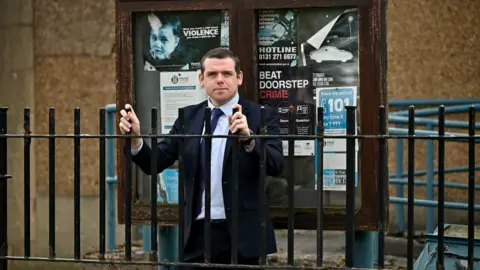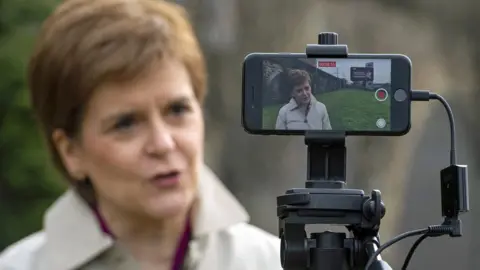Scottish election 2021: Conservatives pledge to end not proven verdict
 Getty Images
Getty ImagesThe Scottish Conservatives have pledged new legislation which would end the "not proven" verdict amid a series of criminal justice election promises.
The not proven verdict, unique to the Scottish justice system, has been controversial in recent years.
The Tories will look to make trial a straight decision between guilty and not guilty if the law is passed.
Leader Douglas Ross said the bill would be the first act of his party in the new parliamentary term.
MSPs previously voted in February 2016 to reject an earlier bid to abolish the not proven verdict from Scotland's courts.
At that time the Scottish government voiced concerns about a provision which would require two thirds of a jury to support any verdict.

What is the not proven verdict?
Scotland, unlike most of the world's legal systems, has three possible verdicts in criminal cases - guilty, not guilty and not proven.
The legal implications of a not proven verdict are exactly the same as a not guilty verdict - the accused is acquitted and is innocent in the eyes of the law.
Not proven is seen by some as offering additional protection to the accused, ensuring they will not be convicted if the jury has any doubts.
But critics argue that it is confusing for juries and the public, can stigmatise an accused person by appearing not to clear them and fails to provide closure for victims.

Mr Ross highlighted a "disproportionate number of not proven verdicts in rape cases" which he said "certainly doesn't deliver for the victim and it still leaves the accused with an uncertain verdict".
"Guilty or not guilty is clear, not proven is too ambiguous," he added.
Other election pledges made by Mr Ross also include what he calls Suzanne's law and Michelle's law.
Named after Suzanne Pilley, who was murdered in 2010, the legislation would mean convicted murderers could not be released until they revealed the whereabouts of their victim's remains.
Under Michelle's law, named after 17-year-old Michelle Stewart who was murdered in 2008, the families of victims would be given a greater say over release arrangements.
Ms Stewart's sister said she supported the legislation.
Mr Ross said: "We are on the side of crime victims whose pain and suffering is often compounded by their experience of the criminal justice process.
"There is so much we can do to improve the prevention and detection of crime but also how victims and their families can be treated with decency and respect.
"The family of Michelle Stewart are an example to us all. Having suffered such a tragic loss, they have found the strength to campaign to improve the system for others.
"Our victims law will give victims and their families a meaningful voice and bring much needed transparency to prosecutions, courts and parole."

SCOTLAND'S ELECTION: THE BASICS
What elections are happening? On 6 May, people across Scotland will vote to elect 129 Members of the Scottish Parliament (MSPs). The party that wins the most seats will form the Scottish government. Find out more here.
What powers does the Scottish Parliament have? MSPs pass laws on most aspects of day-to-day life in Scotland, such as health, education and transport. They also have control over some taxes and welfare benefits. Defence, foreign policy and immigration are decided by the UK Parliament.
How do I vote? Anyone who lives in Scotland and is registered to vote is eligible, so long as they are aged 16 or over on the day of the election. You can register to vote online.

Speaking at a former police station in Loanhead, Midlothian, Mr Ross outlined a number of other justice policies his party proposes.
They include doubling the maximum sentence for attacks on emergency workers to two years, introducing whole life custody orders, ending automatic early release and enabling all victims of crime to be able to make impact statements.
He added: "This is also about reversing damaging SNP cuts to policing in communities such as here in Loanhead where the police station lies empty.
"My wife is a police officer and I am passionate about protecting them and giving them the resources they need to serve the public."
The SNP has pledged to protect the police revenue budget in real terms for the entirety of the next parliament and strengthen the service with extra officers, as well as support the rehabilitation of offenders by improving community-based alternatives to short-term prison sentences.
Scottish Labour has promised to restore the connections between the police force and local communities, while the Greens want to make Police Scotland more accountable. The Lib Dems have pledged stronger action to stop reoffending and cut crime, and new measures to give confidence to victims of crime.
'Catch-up plan for cancer'
Elsewhere on the campaign trail on Wednesday, Scottish Labour leader Anas Sarwar resumed his focus on cancer care, calling the backlog created by the coronavirus pandemic a "national emergency".
Figures released on Tuesday by Public Health Scotland (PHS) show 485 people waited more than two months to start cancer treatment after receiving an urgent referral in the last quarter of 2020.
"Cancer remains Scotland's biggest killer, even during the pandemic, and we already know there are 7,500 undiagnosed cancers across the country," he told BBC Scotland.
"We need a catch-up plan with more workforce, rapid diagnosis centres right across the country and dedicated surgeries doing catch-up procedures that people haven't had."
First Minister Nicola Sturgeon officially launched the SNP's campaign, highlighting their "most diverse list of regional candidates ever" - including members from ethnic minority communities and those with disabilities.
 PA Media
PA MediaMs Sturgeon said these "most serious of times" call for "experienced leadership and serious government", and tackling the Covid pandemic would continue to be her "number one priority".
Her government's plans would include a new National Care Service and a cancer recovery plan, while jobs, the economy and the housing crisis would be a big focus should the SNP be re-elected.
"These measures will offer practical help but they also tell a story of the kind of Scotland we can be," Ms Sturgeon said. "A country of compassion and solidarity where we look out for one another and offer a helping hand."
Scottish Greens co-leader Lorna Slater was in Falkirk to set out her party's policy on rent, calling for rent controls and a new regulator to investigate complaints about private sector landlords.
Willie Rennie, leader of the Scottish Lib Dems, said a commission on tackling violence against women should be set up as a priority in the next parliament with cross-party backing.
"Inequalities like these prevent people from living their lives to the full, and are corrosive to society as a whole," he added.
